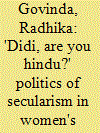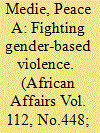| Srl | Item |
| 1 |
ID:
118927


|
|
|
|
|
| Publication |
2013.
|
| Summary/Abstract |
In this paper I take the women's movement as the site for unpacking some of the strains and tensions involved in practical interpretations of secularism in present-day India. Several sources within and outside the movement point out that there has been a tendency to take the existence of secularism for granted, and that the supposedly secular idioms and symbols used for mobilizing women have been drawn from Hindu religio-cultural sources. Women from Dalit and religious minority communities have felt alienated by this. Hindu nationalists have cleverly appropriated these idioms and symbols to mobilize women as foot soldiers to further religious nationalism. Through a case-study of a grassroots women's NGO working in Uttar Pradesh, I seek to explore how women's organizations may be reshaping their agendas and activism to address this issue. Specifically, I will examine how and why the 2002 Gujarat riots affected the NGO, the ways in which it has started working on the issue of communal harmony and engaging with Muslims since the riots, and the challenges with which it has been confronted as a result of its efforts. In doing so, I will show how the complexities of NGO-based women's activism have become intertwined with the politics of secularism.
|
|
|
|
|
|
|
|
|
|
|
|
|
|
|
|
| 2 |
ID:
120983


|
|
|
|
|
| Publication |
2013.
|
| Summary/Abstract |
Many African states have adopted laws that criminalize rape and other forms of gender-based violence (GBV), but the enforcement of such laws is often weak. Many rape cases are never brought to court and victims are frequently encouraged to accept reconciliation instead of prosecution of offenders. Drawing on research from post-conflict Liberia, this article investigates the ability of women's movements to influence the state's implementation of rape law, and seeks to theorize the relationship between women's activism and the enforcement of rape law. It documents the range of strategies adopted by the Liberian women's movement, and argues that these tactics have contributed to an increased referral of rape cases to court. This was made possible by two conditions: a relatively open political environment and political and material support from international organizations, which in turn enabled women's NGOs to gain access to and make an impression on the implementation process. This demonstrates the capacity of civil society organizations in Africa's more open and internationally connected states to influence policy at the implementation stage-even in particularly challenging areas such as women's rights.
|
|
|
|
|
|
|
|
|
|
|
|
|
|
|
|